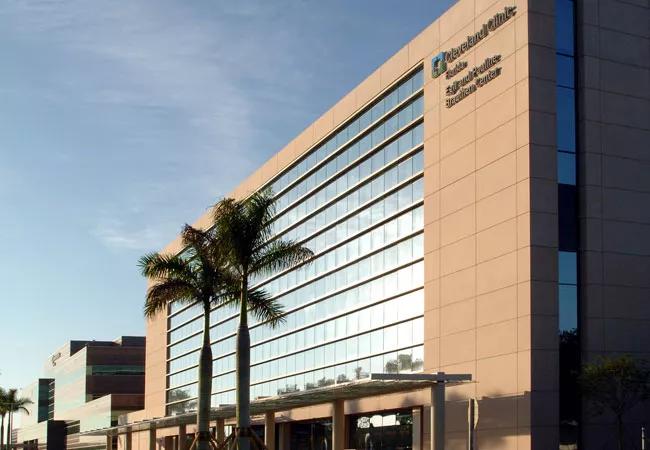International coordination brings big local benefits

When Bobby Zervos, DO, came to Cleveland Clinic Florida to help build a transplant program, he never imagined that the team would perform over 1,000 solid organ transplants in less than seven years. “In 2013, we had 155 beds, and I had just come from places with ten times that capacity,” he says. “What we have done as a team in terms of volume and expertise is truly unprecedented for a hospital our size.”
Advertisement
Cleveland Clinic is a non-profit academic medical center. Advertising on our site helps support our mission. We do not endorse non-Cleveland Clinic products or services. Policy
The key to the hospital’s success is its role as one of several sites in Cleveland Clinic’s international transplant program. “We have many resources here in Florida,” says Dr. Zervos, Medical Director of Liver Transplantation and Associate Chair of Transplantation at Cleveland Clinic Florida. “But we also draw upon the resources in Ohio and in Abu Dhabi. All of our Ohio transplant surgeons are licensed and credentialed here, so that if an organ becomes available and our team is overwhelmed with other transplants, we can still help those patients.”
The program performed its first transplant in Florida in mid-2013 and has now performed over 300 liver, 900 kidney and 100 heart transplants. In recent years, the living donor kidney transplant program has flourished, and Antonio Pinna, MD, came from Cleveland Clinic Abu Dhabi to establish living donor liver transplants, which the team hopes to begin in 2021.
“We have the full support of Cleveland Clinic as an enterprise behind our efforts to perform living donor liver transplants,” says Dr. Pinna. “The Ohio team does many of these each year and has flown to Abu Dhabi to assist us, and we’ve performed about a dozen there. They have shared all of that expertise with us.”
Dr. Pinna also performs bowel lengthening surgery, an alternative to small intestine transplant that can double or triple the amount of existing small intestine in a patient over time.
The transplant teams at each site work together to form a team of teams, sharing staff, grand rounds and selection committee across geographies. “Currently, we are working on a way to share the expertise of transplant psychiatrists in Ohio with our patients in Florida,” says Charles Miller, MD, Enterprise Director of Transplantation at Cleveland Clinic. “These specialists are uncommon, but as an enterprise-wide program, our patients in Florida can benefit from expertise in Ohio.”
Advertisement
In recent years, the number of otherwise healthy organs infected with hepatitis C (HCV) has exploded, likely due to the opioid epidemic. With the advent of direct-acting antiviral agents (DAAs), those organs can now be available for transplant. Cleveland Clinic Florida began by treating all historical transplant patients who had HCV with DAAs; the drugs cured the virus with no negative interactions with anti-rejection medications. “DAAs have revolutionized our perspective on the hepatitis C virus: It was once difficult to manage and control and now it is easily treated,” says Dr. Zervos.
Next, HCV-positive kidney transplant candidates were treated with DAAs before transplantation to clear the virus, due to concern over HCV possibly causing kidney dysfunction. Again, the drugs were effective and eventually led to a change in practice by transplanting HCV-infected organs into HCV-positive recipients. Outcomes were once again beneficial with no drug interactions with immunosuppressive regimens.
In January 2018, Cleveland Clinic began offering HCV-negative transplant candidates the option of HCV-infected organs after spending a year developing their carefully outlined protocol. “We did our first few in February of 2018, and now we’re close to 90-plus organs here in Florida, more than double that when you consider the entire system,” says Dr. Zervos. The team published a report about their experience in Hepatology in July 2020.
Exponential growth in transplant and other surgical programs led to the completion of a $232 million expansion in 2018, more than doubling the available intensive care unit beds and adding three operating rooms for surgeries of various types.
Advertisement
“Cleveland Clinic is very committed to serving the people of Broward County, and all of Florida, but it starts with the doctor-patient relationship,” says Dr. Zervos. “The patients become an extended part of our families, and that is what has made our program so effective, despite starting from the ground up in a small hospital.”
Advertisement
Advertisement

Nonthermal technique reduces bleeding and perforation risk

Standardizing a minimally invasive approach for Barrett’s Esophagus and Esophageal Cancer

PSMA-targeted therapy for metastatic prostate cancer now offered at Cleveland Clinic Weston Hospital

Nationally recognized urologic oncologist offers vision for growth, innovation, and excellence

Noninvasive modality gains ground in United States for patients with early-to-moderate disease

Cleveland Clinic Weston Hospital’s collaborative model elevates care for complex lung diseases

Interventional pulmonologists at Cleveland Clinic Indian River Hospital use robotic technology to reach small peripheral lung nodules

Trained in the use of multiple focal therapies for prostate cancer, Dr. Jamil Syed recommends HIFU for certain patients with intermediate-risk prostate cancer, especially individuals with small, well-defined tumors localized to the lateral and posterior regions of the gland.